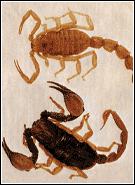As much as creepy-crawlies might make you squirm, the fact remains that insects and spiders are amazing critters that’ll be around long after we fragile humans are gone.
But even though they demand some level of respect, there is a limit to how far most of us will tolerate the bugs that live among us. In fact, sometimes these tiny creatures can actually endanger our lives.
And whether it’s ridding your home of pesky freeloading roaches, asthma-causing dustmites, or ensuring those darn mosquitoes don’t disturb your sleep, learning to deal with insects on a daily basis can make your life a whole lot easier.
Bees
Get out of the way – even if the swarm is coming in your direction, it doesn’t always mean they’re after you; get under cover fast – indoors is best, but it could also help to get into a car or a tent, or cover yourself with a blanket or clothing; when running away from a swarm, try to run in a straight line, and keep your face as well covered as possible; don't get into water – the bees know you’re there, and can wait for you at the surface longer than you can hold your breath; don’t hit out at the bees or attempt to ‘shoo’ them away – this could encourage them to sting in self-defence. Finally, if you are stung repeatedly, get medical attention as fast as possible.
Mozzies
Before heading off into the great wild yonder, make sure you check the area’s malaria risk. Talk to your doctor or pharmacist about taking the proper medication, and protect yourself and your family against a potentially deadly disease.
Mosquitoes can disrupt sleep, and leave nasty bites. Keep them off you by: wearing long pants and shirts with long sleeves – especially at dawn and dusk; use long-lasting insecticide sprays inside homes and buildings; apply mosquito repellents directly to the skin; and use mosquito netting over the beds – these can be soaked in certain types of insecticide.
Dust mites
The bad news is that your mattress could contain dust mites, which live off the flakes of skin shed on mattresses. The moist, warm conditions in mattresses contribute to this accumulation. Although dust mites generally don't spread germs, their faecal waste contains a protein that causes an allergic reaction in many people. Wheezing, coughing, itchy eyes, allergic rhinitis and eczema characterise this. Dust mites can also contribute to emphysema and bronchitis.
Cover your mattress with an impermeable cover and pull your bedcovers back each morning to allow the bed to air thoroughly. Wash your bedding once a week at 60°C in soapy water to destroy mites. Turn your mattress and vacuum it each month and expose it to fresh air and sunlight whenever possible. Keep your pets out of the bedroom.
Cockroaches
Even the cleanest houses can sometimes attract a nasty entourage of roaches. But there are ways to rid your home of these creepy critters.
Wipe down surfaces where you prepare food or eat after every meal or snack – clean up all food spills promptly; don't leave dirty dishes out overnight; wash pet food dishes daily, and don’t leave food out overnight; wipe down the stove top every night after cooking; clean the inside of the oven and the stove hood regularly; store non-refrigerated food in glass or plastic containers with well-fitting lids; keep rubbish and compost in closed bins; dispose of rubbish as often as possible; and vacuum and sweep regularly to remove food debris.
Lice
Every school has a lice epidemic at some or other time, so chances are good that your child might be affected in one way or another. Lice infestation is not a serious health threat, but can be very embarrassing for a child. Learn how to protect your child from lice infestation and how to treat it if it does happen.
Teach your child not to share combs, brushes or hats with other children and make sure that the school washes hats, pillow cases, sheets and towels regularly. If your child happens to have lice, ask your pharmacist to recommend a low-toxicity insecticide cream.
Scorpions
Scorpions come in all shapes and sizes, some harmless, others deadly. When spending time in the wilderness, it’s important to remember that underneath those rocks you’re turning over might be an unpleasant surprise.
Wear shoes - covered shoes are best - and particularly at night; take care when lifting up rocks and fallen branches – wear sturdy gloves when doing camping chores like building a fire, moving rocks to put up a tent etc.; set up and pack up camp while there’s daylight; shake out bedding before you get into it and when packing up; do the same with clothes and shoes before dressing; don’t sleep directly on the ground – use a groundsheet at least; avoid sleeping right next to where scorpions may be hanging out, like thick vegetation.
(Health24, updated 2010)




 Publications
Publications
 Partners
Partners












